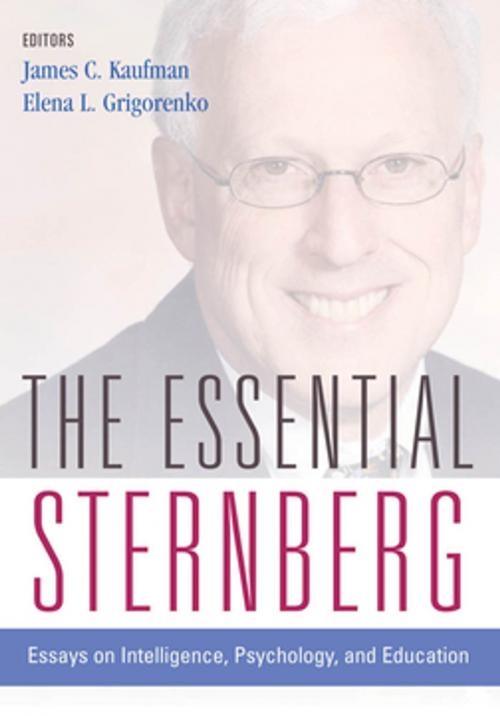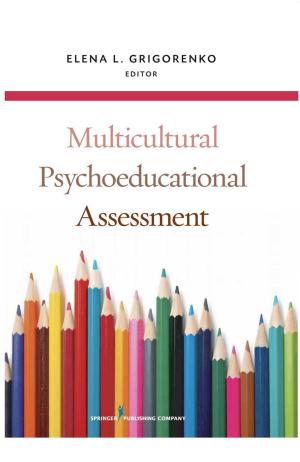The Essential Sternberg
Essays on Intelligence, Psychology, and Education
Nonfiction, Reference & Language, Education & Teaching, Educational Theory, Educational Psychology, Health & Well Being, Psychology, Applied Psychology| Author: | James C. Kaufman, PhD | ISBN: | 9780826138385 |
| Publisher: | Springer Publishing Company | Publication: | December 11, 2008 |
| Imprint: | Springer Publishing Company | Language: | English |
| Author: | James C. Kaufman, PhD |
| ISBN: | 9780826138385 |
| Publisher: | Springer Publishing Company |
| Publication: | December 11, 2008 |
| Imprint: | Springer Publishing Company |
| Language: | English |
"I strongly recommend this book to people working in the area of intellectual disabilities...It may open new vistas that are not always available in the traditional disability literature. It will especially challenge psychologists working in this field."--Journal of Policy and Practice in Intellectual Disabilities
"For years, Robert Sternberg has produced renowned, groundbreaking work, and now some of it is captured in one volume:The Essential Sternberg...Established scholars and novices to the field will find this book a useful addition to their libraries."--Psychology of Aesthetics, Creativity, and the Arts
"[Sternberg] approaches the definition of intelligence from a very pragmatic perspective...Sternberg's focus on success in the real world is refreshing."--Teacher's College Record
Any follower of Sternberg and theories of intelligence will need this collection on their bookshelf.
Robert J. Sternberg has argued that the conventional idea of intelligence is, at best, incomplete. Therefore, he has redefined the core concept of intelligence: Sternberg's groundbreaking, triarchic theory proposes that intelligence is measured not just by factual knowledge or "book smarts," but also by the integration of creative ability, practical know-how, and analytic reasoning.
As the former President of the American Psychological Association, current Dean of Tufts University, and one of the top 100 psychologists of the 20th century, according to the APA Monitor on Psychology, Sternberg is listed as one of ISI's most highly cited authors (top .5%) in psychology.
Sternberg has authored over 1,000 journal articles, book chapters, and books. This comprehensive collection compiles the best of Sternberg-his most influential, career-defining articles culled from over 30 years of research. Serving as an introduction to and summary of his most critical contributions to the field, this book:
- Presents articles that track the development and progression of Sternberg's theory of successful intelligence
- Includes his most influential articles, such as "The nature of creativity" and "The Rainbow Project: Enhancing the SAT"
- Features articles on educational policy and how Sternberg's intelligence models can be used to improve student performance and supplement traditional exams
- Contains new articles on Sternberg's most recent theory, the Wisdom, Intelligence, Creativity, Synthesized (WICS) model
"I strongly recommend this book to people working in the area of intellectual disabilities...It may open new vistas that are not always available in the traditional disability literature. It will especially challenge psychologists working in this field."--Journal of Policy and Practice in Intellectual Disabilities
"For years, Robert Sternberg has produced renowned, groundbreaking work, and now some of it is captured in one volume:The Essential Sternberg...Established scholars and novices to the field will find this book a useful addition to their libraries."--Psychology of Aesthetics, Creativity, and the Arts
"[Sternberg] approaches the definition of intelligence from a very pragmatic perspective...Sternberg's focus on success in the real world is refreshing."--Teacher's College Record
Any follower of Sternberg and theories of intelligence will need this collection on their bookshelf.
Robert J. Sternberg has argued that the conventional idea of intelligence is, at best, incomplete. Therefore, he has redefined the core concept of intelligence: Sternberg's groundbreaking, triarchic theory proposes that intelligence is measured not just by factual knowledge or "book smarts," but also by the integration of creative ability, practical know-how, and analytic reasoning.
As the former President of the American Psychological Association, current Dean of Tufts University, and one of the top 100 psychologists of the 20th century, according to the APA Monitor on Psychology, Sternberg is listed as one of ISI's most highly cited authors (top .5%) in psychology.
Sternberg has authored over 1,000 journal articles, book chapters, and books. This comprehensive collection compiles the best of Sternberg-his most influential, career-defining articles culled from over 30 years of research. Serving as an introduction to and summary of his most critical contributions to the field, this book:
- Presents articles that track the development and progression of Sternberg's theory of successful intelligence
- Includes his most influential articles, such as "The nature of creativity" and "The Rainbow Project: Enhancing the SAT"
- Features articles on educational policy and how Sternberg's intelligence models can be used to improve student performance and supplement traditional exams
- Contains new articles on Sternberg's most recent theory, the Wisdom, Intelligence, Creativity, Synthesized (WICS) model















